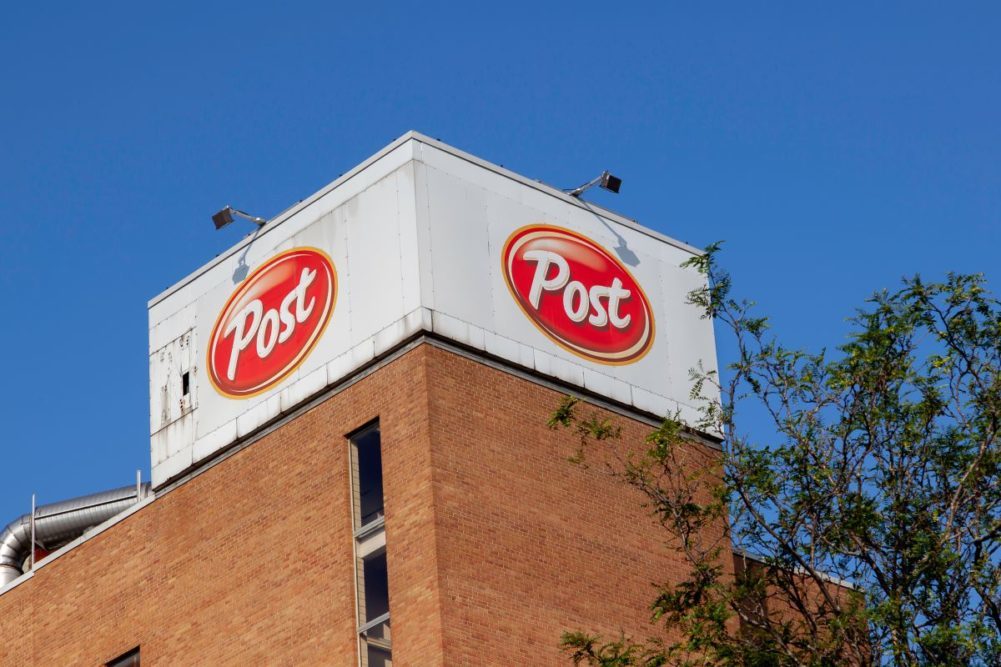ST. LOUIS — Pet food and foodservice categories helped bolster earnings for Post Holdings, Inc. in the third quarter ended June 30. In late April, Post completed the acquisition of a portion of the J. M. Smucker Co.’s pet food business, which reflected favorably in the company’s earnings report. Additionally, first- and second-quarter momentum from the foodservice sector carried into this quarter, helping offset a slight softening in branded breakfast products as consumers increasingly turn to private label options to stave off inflationary pressures.
Post had net earnings of $89.6 million in the third quarter, equal to $1.49 per share on the common stock, down 48% from $170.2 million, or $2.77 per share, in the previous year’s third quarter. Income on swaps was $17.1 million, compared with income on swaps of $131.6 million in the previous year’s third quarter. Adjusted EBITDA was $338.2 million, up 35% from $250.8 million in the previous year’s third quarter. Net sales were $1.86 billion, up 22% from $1.52 billion.
In Post Consumer Brands, net sales rose 52% to $871.3 million, which included $275.3 million attributable to Pet Food. Excluding the gains from Pet Food, third quarter volume fell 5.7%, primarily driven by declines in peanut butter and branded cereal. Volume increases in private label cereal partially offset the decline.
“So we’ve got pet, cereal and peanut butter under the Post Consumer Brands segment,” said Robert V. Vitale, president and chief executive officer, during an Aug. 4 conference call with analysts. “So what we’re going to be able to share with you, of course, with another quarter as they plan for 2024, you’re going to start to see the changes in the segment. Obviously, the lion’s share of the changes in the segment are driven by the pet acquisition. We’re not going to give specific updated guidance on pet because it is part of a larger segment, but I think will be relatively easy to track the progression over the next couple of quarters.”
Mr. Vitale also specifically cited the March reduction of Supplemental Nutrition Assistance Program (SNAP) as causing “a bit of a blip in volume consumption” in the branded cereal category.
The forecast for adjusted EBITDA in the fiscal year was raised to $1.18 billion to $1.20 billion from $930 million to $945 million in the same quarter a year ago.
“Had we not just had the twin events of adding pet and having quite an outsized performance year-to-date in foodservice, we wouldn’t be talking about ‘24 just yet,” Mr. Vitale said. “That’s not a normal cadence. So what we are trying to do is try to be respectful of the challenges you all face with the complexity that we sometimes create and give you a little bit more of our thinking as it relates to a period of time a bit further out than we would normally do so.”
Net sales in foodservice increased 7.5% to $622.7 million when compared with last year’s third quarter. Volume rose 3%, driven by away-from-home demand for eggs and potatoes. Potato volumes increased 6.8% and egg volumes increased 2.3%.
“Let’s focus mostly on our side dish business, which is the core of the franchise,” Mr. Vitale said. “Along with everyone else, we took considerable price (hits) the last two years. At the same time, this is the segment that had the most challenging supply chain two years ago and it is the segment that has had the most improvement in supply chain over these last two years.
“So we were in a position the (18 months prior to the last 6) in which we had poorly performing supply chains, price escalation, lack of advertising support because advertising made no sense given our inability to support incremental product within our supply chain. So that’s not a great position for growing a brand. We’ve now fixed the supply chain. We’ve now fixed the lack of marketing support or we are in the process of doing so. And pricing is normalizing as some of our competitors have now priced. So I feel optimistic that the problems in that area were a combination of self-inflicted and macro supply chain problems that are behind us.”
In Weetabix, net sales increased 7.4% to $134.2 million. Volumes declined 4.7% as private label biscuit growth was offset by declines in branded biscuits.
“We think that there is going to be a strengthening position in our refrigerated business as we engage with advertising,” Mr. Vitale said. “We’ve invested heavily in Weetabix at the expense of Weetabix’s current year performance. So we are positioned nicely going into ‘24. It would be nice to see some macro strengthening there. But what we can control, we are well controlling. Our foodservice business, even outside the pricing dynamics of AI is in very attractive shape. We’ve long talked about the investment we made in precook capacity, and we made a heavy investment in precook capacity right ahead of COVID, which for a couple of years looked questionable. Now it is paying off in spades as we see a higher mix towards value-added products.”
Over the first nine months of the fiscal year, net earnings of $235.6 million, or $4.13 per share on the common stock, were down from $672.7 million, or $10.96 per share, in the same time during the previous year. Net sales jumped 18% to $5.04 billion from $4.27 billion in the prior year period.





